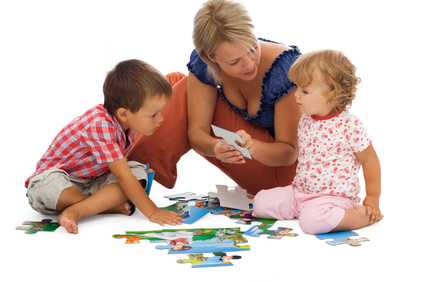Preventing Anxiety & Insecurity in Children
Check out this amazing quote: “In our half-century of international research, we’ve not found any other class of experience that has as strong and consistent an effect on personality and personality development as does the experience of  rejection, especially by parents in childhood.” Ronald Rohner of the University of Connecticut made this statement after reviewing multiple studies of families and children. To rephrase—nothing has a stronger and more consistent impact on children than the experience of rejection by a parent. That is a bold statement! He goes on to explain that children who feel rejection by their parents tend to feel more anxious and insecure, behave in a more hostile and aggressive way toward others, and even experience difficulty forming secure, trusting relationships as adults. This researcher also noted that perceived rejection activates the same part of the brain as actual physical pain. Rejection hurts and the person who experiences rejection can relive that pain over and over again for years.
rejection, especially by parents in childhood.” Ronald Rohner of the University of Connecticut made this statement after reviewing multiple studies of families and children. To rephrase—nothing has a stronger and more consistent impact on children than the experience of rejection by a parent. That is a bold statement! He goes on to explain that children who feel rejection by their parents tend to feel more anxious and insecure, behave in a more hostile and aggressive way toward others, and even experience difficulty forming secure, trusting relationships as adults. This researcher also noted that perceived rejection activates the same part of the brain as actual physical pain. Rejection hurts and the person who experiences rejection can relive that pain over and over again for years.
 rejection, especially by parents in childhood.” Ronald Rohner of the University of Connecticut made this statement after reviewing multiple studies of families and children. To rephrase—nothing has a stronger and more consistent impact on children than the experience of rejection by a parent. That is a bold statement! He goes on to explain that children who feel rejection by their parents tend to feel more anxious and insecure, behave in a more hostile and aggressive way toward others, and even experience difficulty forming secure, trusting relationships as adults. This researcher also noted that perceived rejection activates the same part of the brain as actual physical pain. Rejection hurts and the person who experiences rejection can relive that pain over and over again for years.
rejection, especially by parents in childhood.” Ronald Rohner of the University of Connecticut made this statement after reviewing multiple studies of families and children. To rephrase—nothing has a stronger and more consistent impact on children than the experience of rejection by a parent. That is a bold statement! He goes on to explain that children who feel rejection by their parents tend to feel more anxious and insecure, behave in a more hostile and aggressive way toward others, and even experience difficulty forming secure, trusting relationships as adults. This researcher also noted that perceived rejection activates the same part of the brain as actual physical pain. Rejection hurts and the person who experiences rejection can relive that pain over and over again for years. Children can feel rejected for many reasons. Perhaps they truly do have a rejecting parent. More likely, children have parents who do not actively reject them. Instead, they have parents who do not look up from the paper when their children talk to them…or parents that expend so much time and energy at work that they have no energy left for family…or parents who spend more time with their buddies, their hobbies, their yard, or their project than they do with their children. In each of these cases, children may feel rejected. Why? Because children sense that whatever takes up a parent’s time or attention is the parent’s top priority…everything else is simply rejected, even if that something else is them.
Of course, the flip side of rejection is acceptance. When children feel the unconditional acceptance of parents, they feel more secure and confident, they will more easily develop trusting relationships with others, and they learn to resolve difficulties without hostility and aggression. How can you make your child feel accepted? Here are a few hints:
will more easily develop trusting relationships with others, and they learn to resolve difficulties without hostility and aggression. How can you make your child feel accepted? Here are a few hints:
 will more easily develop trusting relationships with others, and they learn to resolve difficulties without hostility and aggression. How can you make your child feel accepted? Here are a few hints:
will more easily develop trusting relationships with others, and they learn to resolve difficulties without hostility and aggression. How can you make your child feel accepted? Here are a few hints: · Spend time talking and playing with them each day. Instead of you directing the play, let them lead. Play what they want to play and follow their lead in play.
· Notice and describe their actions. Whether you acknowledge that they set the table or colored the dog red, your children learn that you notice them…and, if you notice them, you accept them.
· Find ways to tell your children “yes.” Of course, you will have to say “no” sometimes, but look for the “yeses” as well. For instance, you may have to say, “No, you can’t go swimming today” but can you add in a “yes” like, “You could go tomorrow (or some other day)”? You will have to say, “No, you can’t play with that.” But, you can add a “yes” by simply saying, “Here, why don’t you play with this instead?” Finding ways to tell your child “yes” informs them that you want them to enjoy life, you accept their curiosity, and you accept their desire to remain active. You simply help them direct that energy in a positive direction.
· Spend time with your child. Nothing spells love and acceptance like “T-I-M-E.”
· Laugh with your children. Tell jokes. Be silly. Enjoy a funny show. Make fun of yourself a little bit at times. Teach them to not take life “too seriously,” but to enjoy life along the way.
· Encourage your children.
· Surprise your children with little spontaneous gifts or cards. These gifts can range from bringing home a rock for your little rock collector to downloading a new song for the budding musician in your family to cooking a special treat for the young culinary artist.
 · Spend time learning about your children’s interests and asking them about those interests. Pick up a book on that interest. Take them to a related store. Hook them up with another person who has a similar interest. Take up the interest yourself and use that interest as a vehicle to spend time with your child.
· Spend time learning about your children’s interests and asking them about those interests. Pick up a book on that interest. Take them to a related store. Hook them up with another person who has a similar interest. Take up the interest yourself and use that interest as a vehicle to spend time with your child.
· Did I say spend time with your child?
· Notice and describe their actions. Whether you acknowledge that they set the table or colored the dog red, your children learn that you notice them…and, if you notice them, you accept them.
· Find ways to tell your children “yes.” Of course, you will have to say “no” sometimes, but look for the “yeses” as well. For instance, you may have to say, “No, you can’t go swimming today” but can you add in a “yes” like, “You could go tomorrow (or some other day)”? You will have to say, “No, you can’t play with that.” But, you can add a “yes” by simply saying, “Here, why don’t you play with this instead?” Finding ways to tell your child “yes” informs them that you want them to enjoy life, you accept their curiosity, and you accept their desire to remain active. You simply help them direct that energy in a positive direction.
· Spend time with your child. Nothing spells love and acceptance like “T-I-M-E.”
· Laugh with your children. Tell jokes. Be silly. Enjoy a funny show. Make fun of yourself a little bit at times. Teach them to not take life “too seriously,” but to enjoy life along the way.
· Encourage your children.
· Surprise your children with little spontaneous gifts or cards. These gifts can range from bringing home a rock for your little rock collector to downloading a new song for the budding musician in your family to cooking a special treat for the young culinary artist.
 · Spend time learning about your children’s interests and asking them about those interests. Pick up a book on that interest. Take them to a related store. Hook them up with another person who has a similar interest. Take up the interest yourself and use that interest as a vehicle to spend time with your child.
· Spend time learning about your children’s interests and asking them about those interests. Pick up a book on that interest. Take them to a related store. Hook them up with another person who has a similar interest. Take up the interest yourself and use that interest as a vehicle to spend time with your child. · Did I say spend time with your child?
Engaging in behaviors and interactions that make your children feel accepted will yield amazing dividends. Your children will feel more secure and confident and, as a result, engage in more appropriate behavior. They will more easily develop trusting relationships with others, avoiding dangerous relationships and relationships that can derail them into negative behaviors. They will learn to resolve difficult situations with integrity and honor. They will grow up remembering a loving family and wonderful times.